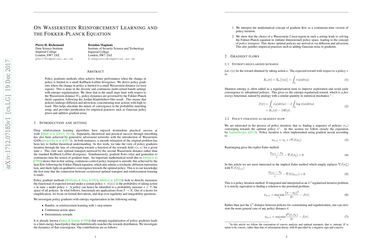On Wasserstein Reinforcement Learning and the Fokker-Planck equation
Policy gradients methods often achieve better performance when the change in policy is limited to a small Kullback-Leibler divergence. We derive policy gradients where the change in policy is limited to a small Wasserstein distance (or trust region). This is done in the discrete and continuous multi-armed bandit settings with entropy regularisation. We show that in the small steps limit with respect to the Wasserstein distance $W_2$, policy dynamics are governed by the Fokker-Planck (heat) equation, following the Jordan-Kinderlehrer-Otto result. This means that policies undergo diffusion and advection, concentrating near actions with high reward. This helps elucidate the nature of convergence in the probability matching setup, and provides justification for empirical practices such as Gaussian policy priors and additive gradient noise.
PDF Abstract
